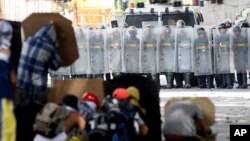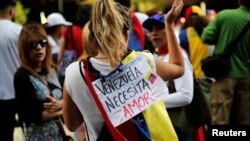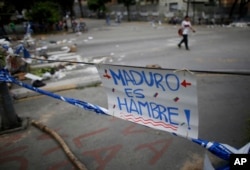A nationwide general strike in Venezuela entered its second day Thursday as street protests left three people dead in the ongoing showdown to protest the socialist government of President Nicolas Maduro.
State prosecutors said one man was shot dead in western Venezuela, while a 14-year-old boy was killed during clashes in the capital, Caracas. Details about the third person’s death were not released.
Millions of workers stayed home Wednesday, leaving streets and highways clear of traffic and scores of businesses closed. Some protesters threw up roadblocks in neighborhoods to keep people from getting to work, leading to deadly confrontations with security forces. The nationwide strike is aimed at forcing Maduro to cancel a vote on creation of a Constituent Assembly that would be tasked with rewriting the constitution.
Maduro has scheduled the vote for this Sunday for the assembly to restore order in Venezuela, where more than 100 people have been killed in almost daily violent clashes between protesters and security forces since April.
Opposition leaders say Maduro intends to assume more authoritarian powers once a constitutional assembly acceptable to him is chosen.
Leopoldo López, an opposition leader, called on Venezuelans Wednesday to continue peaceful street protests, and encouraged the military to ignore government orders to clamp down on activists.
A planned protest march Friday in the capital, Caracas, will follow the 48-hour walkout.
US sanctions
Meanwhile, the United States announced new sanctions Wednesday against 13 individuals connected to the Venezuelan government and state oil company, in an further effort to pressure Maduro to call off Sunday’s vote.
A senior Trump administration official said the individuals targeted include high-ranking current and former officials connected to the Maduro regime, including two Cabinet ministers, the national elections director, the vice president of finance for state-run oil company PDVSA, and the country’s army and police chiefs, among others.
In a statement accompanying the sanctions announcement, Treasury Secretary Steven Mnuchin said further sanctions are possible after the election Maduro called.
“Anyone elected to the National Constituent Assembly should know that their role in undermining democratic processes and institutions in Venezuela could expose them to potential U.S. sanctions,” he said.
Maduro undeterred
The protests at home and backlash from abroad have not deterred Maduro from forging ahead with his plans. The president has followed through on his vow to arrest any new Supreme Court judges appointed by the opposition-dominated National Assembly, with three judges detained by intelligence forces since Saturday.
The protests were sparked by growing anger over Venezuela’s crumbling economy. Once rich with oil, the nation’s revenues have tumbled following the sharp drop in global energy prices; corruption by government officials also is seen as a factor in the economic decline.
Food stocks across the country have dwindled or disappeared, forcing many Venezuelans to cross into neighboring Brazil and Colombia to buy food.
Maduro blames his country’s woes on the United States. He has warned the Organization of American States not to intervene in Venezuela, saying that would surely bring on civil war.
VOA Spanish Service correspondent Alvaro Algarra contributed to this report from Caracas.







